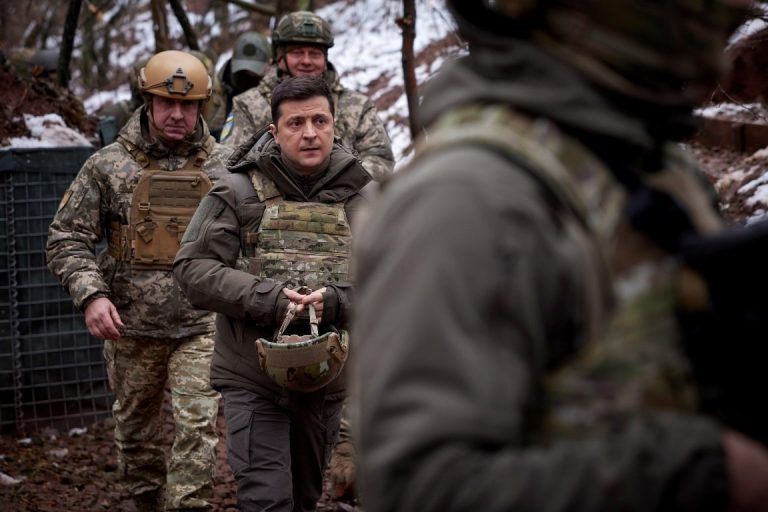27 de enero 2022

Children of Exile: The Births “Sowing Hope” in the Camp of Nicaraguan Farmers

PUBLICIDAD 1M
PUBLICIDAD 4D
PUBLICIDAD 5D
The colonial version of this conflict, which predominates in Latin American media, places our region in front of the Ukrainian mirror.

The colonial version of this conflict
As the temperature rises in the Ukrainian conflict, public opinion and social networks, with their natural tendency to reduce everything to good and evil, reduce the dispute to two powers, the United States and Russia, and call on their audiences to bet on the reason or superiority of one or the other. The struggle over Ukraine’s place on the border between Western and Eastern Europe is neither new nor does it involve only Washington and Moscow.
In its most recent phase, it all goes back to 2013, when President Viktor Yanukovych, having struck juicy trade deals with Vladimir Putin, broke with Europe. The domestic reaction against that turn and the United States support to the western current in Ukraine facilitated the Maidan Revolution and subsequent legislative ouster of Yanukovich.
It was then that the polarization between pro-Russian and pro-European currents settled more clearly in Ukrainian domestic politics. The annexation of Crimea in 2014 and Moscow’s backing of separatist movements in Donetsk and Lugansk, which boycotted the 2014 presidential elections, in which Petro Poroshenko won with 55% of the vote, were decisive steppingstones.
With the governments of Poroshenko and, above all, of his successor, Volodimir Zelenski, who won more votes for the Western coalition, the Ukrainian domestic conflict became international at an accelerated pace.
Putin’s aggressive reaction to the advancement of Ukraine’s NATO membership project is explained by the Russian government’s international doctrine. For Putin, the disintegration of the USSR in 1991 was a catastrophe, not because it implies a setback for the socialist or Marxist cause, but because it weakened Russia’s power and its control over the entire Eastern European region.
The fact that the pro-European current won two consecutive democratic elections is not a sufficiently convincing argument, according to Moscow, to recognize that a Ukrainian majority wants priority links with Europe and the United States. In Putin’s view, Western support for these currents invalidates the democratic character and legitimate origin of any majority. This subordination of democracy to sovereignty, which in this case appears to be linked to the consolidation of the hegemony of a neighboring power, is colonial.
Colonial is also the Western perspective that assumes that there is no pro-Russian social base in Ukraine. Since the Donbas’ war, armed separatist pockets have consolidated in the east. It should not be ruled out that an important sector of Ukrainian society sympathizes with the idea of maintaining privileged relations with Russia. Colonialism acts in two ways, shifting the axis of the conflict from inside to outside Ukraine, and shaping geopolitical sides for which the true general will of that nation counts for little.
Like the small countries of the Caribbean, which have always lived among empires (Spain, Great Britain, France, the United States, the Soviet Union), Eastern European nations such as Ukraine and Poland have suffered from this colonial condition for centuries. Historical experience indicates that it is in the best interest of these border nations to develop diversified international relations, allowing them to benefit from the link with various powers, without conceding supremacy to one of them.
In the current Ukrainian conflict, another variation of the colonial is to erase other international actors, such as Europe or, more specifically, the Normandy Quartet (Germany, France, Russia and Ukraine) that first with Angela Merkel and now with Emmanuel Macron is trying to negotiate détente, in parallel to the positioning of the United States. This colonial version of the conflict, which predominates in Latin American media, does not hide its Cold War legacies, and places our region in front of the Ukrainian mirror.
*This article was originally published in La Razon, Mexico.
This article was published in Spanish in Confidencial and translated by Havana Times
PUBLICIDAD 3M
Historiador y ensayista cubano, residente en México. Es licenciado en Filosofía y doctor en Historia. Profesor e investigador del Centro de Investigación y Docencia Económicas (CIDE) de la Ciudad de México y profesor visitante en las universidades de Princeton, Yale, Columbia y Austin. Es autor de más de veinte libros sobre América Latina, México y Cuba.
PUBLICIDAD 3D